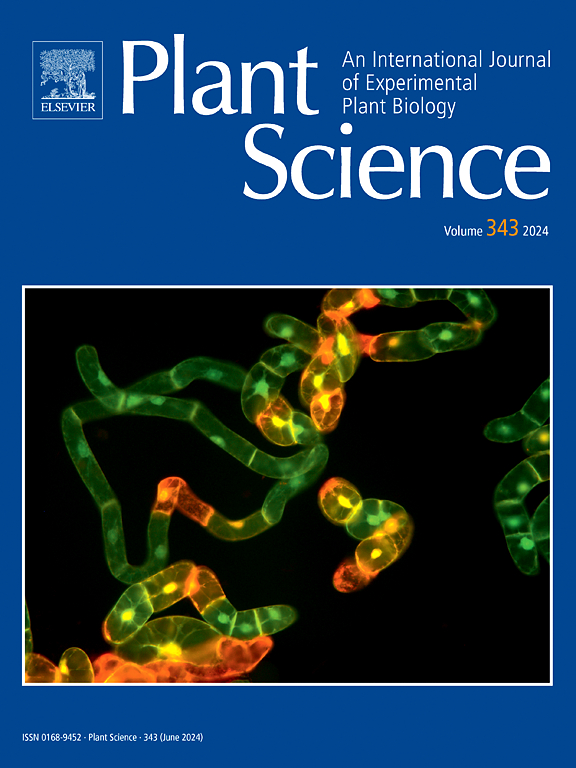nmd介导的转录后调控微调NLR-WRKY调控模块来调节细菌防御反应
IF 4.2
2区 生物学
Q2 BIOCHEMISTRY & MOLECULAR BIOLOGY
引用次数: 0
摘要
无义介导的mRNA衰变(NMD)是一种保守的真核生物监测系统,通过降解异常RNA转录物来维持转录组的完整性。NMD通过直接调节核苷酸结合的富亮氨酸重复序列(NLR)基因来防止自身免疫,从而确保正常的生长和发育。NMD是否直接调控WRKY基因仍不清楚,尽管它们在NMD缺乏的植物中上调,nlr和WRKY之间的潜在反馈也知之甚少。在这项研究中,我们发现NMD也直接调控WRKY基因的一个子集(WRKY15、18、25、33、46、60和70),特别是在较低的温度下(16°C)。含有NMD特征的WRKY46和WRKY70转录本被选为NMD调控WRKY基因的代表,在NMD缺陷突变体中显示半衰期增加。转录组分析表明,这7个nmd调控的WRKY基因是在细菌感染的诱导下产生的。这7个nmd调控的WRKY基因在玉米和水稻中的潜在同源物对细菌病原菌感染表现出类似的诱导作用。此外,这些nmd调控的WRKY基因在植物中以温度依赖的方式诱导过表达抗紫丁香4 (RPS4)。通过WRKY转录因子的ChIP-seq和DAP-seq数据,我们发现WRKY可能通过直接结合启动子区域的W-box来调控大量NLR基因。综上所述,我们的研究结果表明,除了NLR外,NMD机制还调节WRKY基因以保持基础防御水平的控制,WRKY转录因子直接调节NLR基因以构成一个正反馈调节回路,以优化植物对入侵病原体的反应。本文章由计算机程序翻译,如有差异,请以英文原文为准。
NMD-mediated posttranscriptional regulation fine-tunes the NLR-WRKY regulatory module to modulate bacterial defense response
Nonsense-mediated mRNA decay (NMD) is a conserved eukaryotic surveillance system that maintains transcriptome integrity by degrading aberrant RNA transcripts. NMD ensures proper growth and development by preventing autoimmunity through the direct regulation of nucleotide-binding, leucine-rich repeat (NLR) genes. Whether NMD directly regulates WRKY genes remains unclear, despite their upregulation in NMD-deficient plants, and potential feedback between NLRs and WRKYs is also poorly understood. In this study, we showed that NMD also directly regulates a subset of WRKY (WRKY15, 18, 25, 33, 46, 60, and 70) genes, particularly at lower temperatures (16°C). NMD signature-containing transcripts of WRKY46 and WRKY70, selected as representative NMD-regulated WRKY genes, showed increased half-lives in NMD-deficient mutants. Transcriptome analyses showed that these seven NMD-regulated WRKY genes are induced in response to bacterial infection. Potential homologues of these seven NMD-regulated WRKY genes in maize and rice showed similar induction in response to bacterial pathogen infection. Furthermore, these NMD-regulated WRKY genes are induced in plants overexpressing RESISTANT TO P. SYRINGAE 4 (RPS4) in a temperature-dependent manner. By using ChIP-seq and DAP-seq data of WRKY transcription factors, we showed that WRKYs potentially regulate a significant number of NLR genes by directly binding to the W-box in their promoter regions. Taken together, our findings revealed that in addition to the NLRs, the NMD machinery also regulates WRKY genes to keep the basal defense levels in check and the WRKY transcription factors directly regulate NLR genes to constitutes a positive feedback regulatory loop to optimize the plant response to invading pathogens.
求助全文
通过发布文献求助,成功后即可免费获取论文全文。
去求助
来源期刊

Plant Science
生物-生化与分子生物学
CiteScore
9.10
自引率
1.90%
发文量
322
审稿时长
33 days
期刊介绍:
Plant Science will publish in the minimum of time, research manuscripts as well as commissioned reviews and commentaries recommended by its referees in all areas of experimental plant biology with emphasis in the broad areas of genomics, proteomics, biochemistry (including enzymology), physiology, cell biology, development, genetics, functional plant breeding, systems biology and the interaction of plants with the environment.
Manuscripts for full consideration should be written concisely and essentially as a final report. The main criterion for publication is that the manuscript must contain original and significant insights that lead to a better understanding of fundamental plant biology. Papers centering on plant cell culture should be of interest to a wide audience and methods employed result in a substantial improvement over existing established techniques and approaches. Methods papers are welcome only when the technique(s) described is novel or provides a major advancement of established protocols.
 求助内容:
求助内容: 应助结果提醒方式:
应助结果提醒方式:


